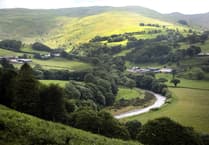Whitland and St. Clears are included on a list of 10 towns as part of proposals to rejuvenate and boost Carmarthenshire’s rural economy.
A cross-party task group has been analysing the issues facing rural life for two years, and its report containing 55 recommedentions has been approved by Carmathenshire County Council’s executive board.
One of the recommendations is to help revitalise 10 towns – Whitland, St Clears, Llandovery, Newcastle Emlyn, Laugharne, Cwmamman, Llanybydder, Kidwelly, Llandeilo and Cross Hands – by developing specific proposals with communities there.
These could include business hubs – with space for start-ups – to support new and existing businesses in the area, and also public sector hubs.
“The impact will be on the villages around as well,” said Clr. Cefin Campbell, executive board member for communities and rural affairs, who introduced the group’s report at a meeting on Monday (July 1).
Just over 60 oer cent of Carmarthshire’s 186,500 population live in the countryside, which is nearly double the Wales average.
The task group wants to boost spending within Carmarthenshire and reverse the trend of around 1,000 young people leaving the county annually.
The report also said a greater rollout of superfast broadband was needed – plus an understanding of why uptake of existing digital infrastructure was low – and better transport links, more affordable housing, and homes for young families.
Clr. Campbell called for less strict planning guidelines and different procurement methods to boost housing supply and support local producers.
Agriculture was described as the backbone of many rural communities with “immeasurable” value, despite only employing 2.9 per cent of the county’s workforce.
Brexit is causing uncertainty for farmers, and a lack of processing facilities has also been a long bugbear.
Carmarthenshire has around 475 dairy farms – 28 per cent of Wales’s total – but the vast majority of milk is transported out of the county and Wales for processing.
The task group has recommended developing a processing facility, based on a co-operative model, to include milk, cream, yoghurt and ice cream.
Clr. Campbell called on the Welsh Government to bring forward a plan recognising the importance of agriculture, and also asked for more money for small rural schools.
Carmarthernshire has 17 rural schools with less than 50 pupils, and sustaining them was described by executive board member for education Clr. Glynog Davies as a “vast” financial challenge.
Tourism is a significant growth sector in the county, and the report recommended developing new cycle routes on disused railway lines.
Clr. Campbell also said the county needed to better showcase its numerous rural events and shows, and praised the resilience of rural residents.
But he added: “Social isolation is becoming more and more of a concern.”
The report will go before full council before a costed action plan is developed.
The impact on officer resources was raised at the meeting.
Chief executive Wendy Walters said taking the plans forward would mean a redirection of existing resources.





Comments
This article has no comments yet. Be the first to leave a comment.